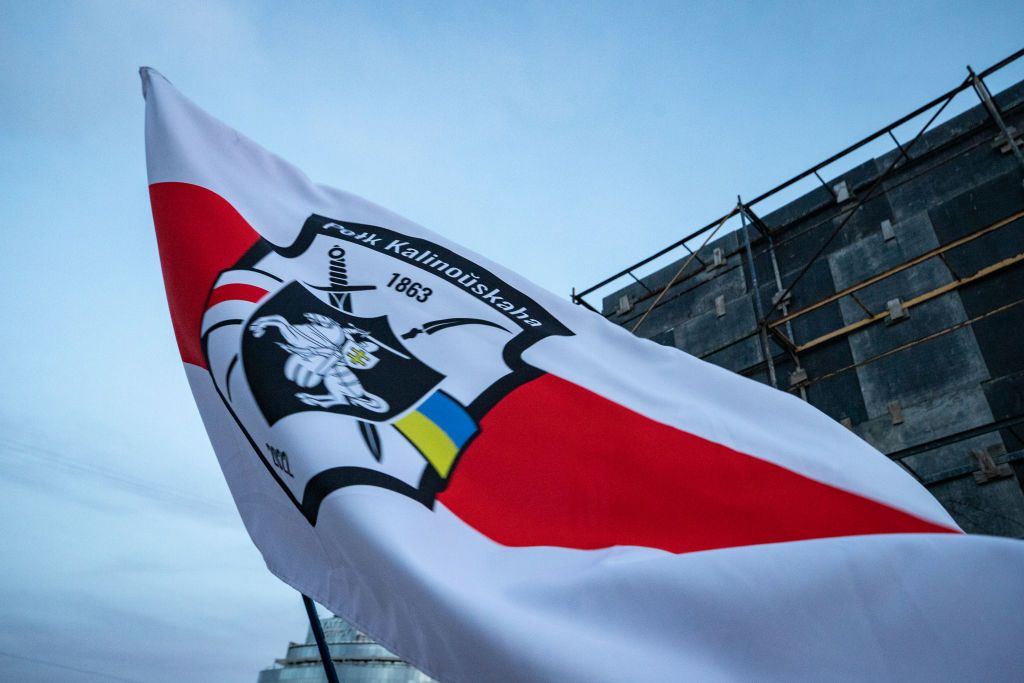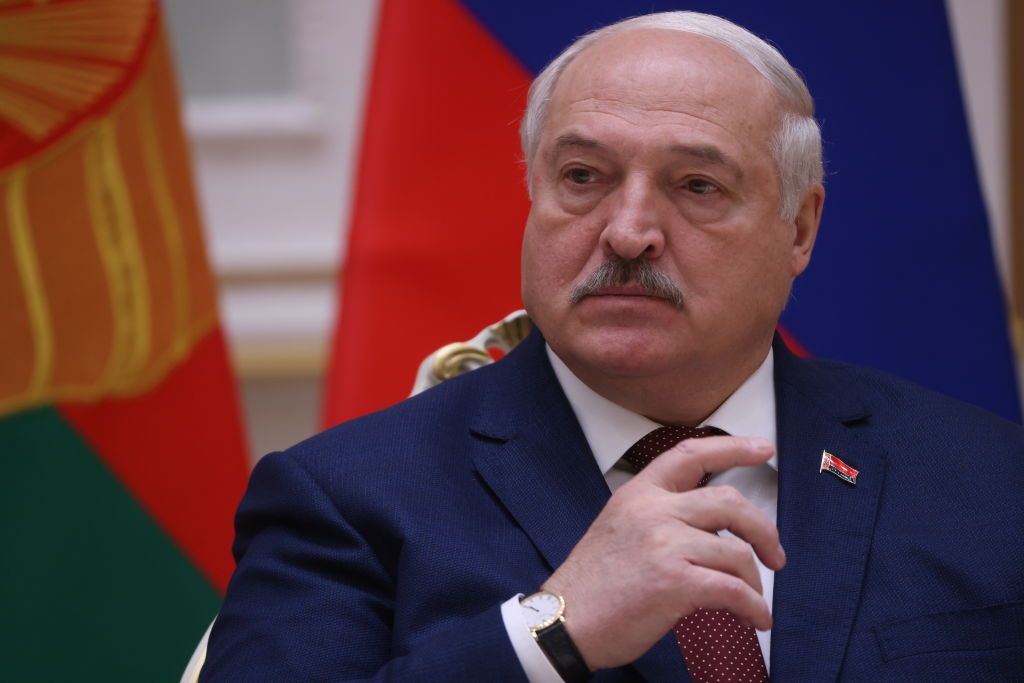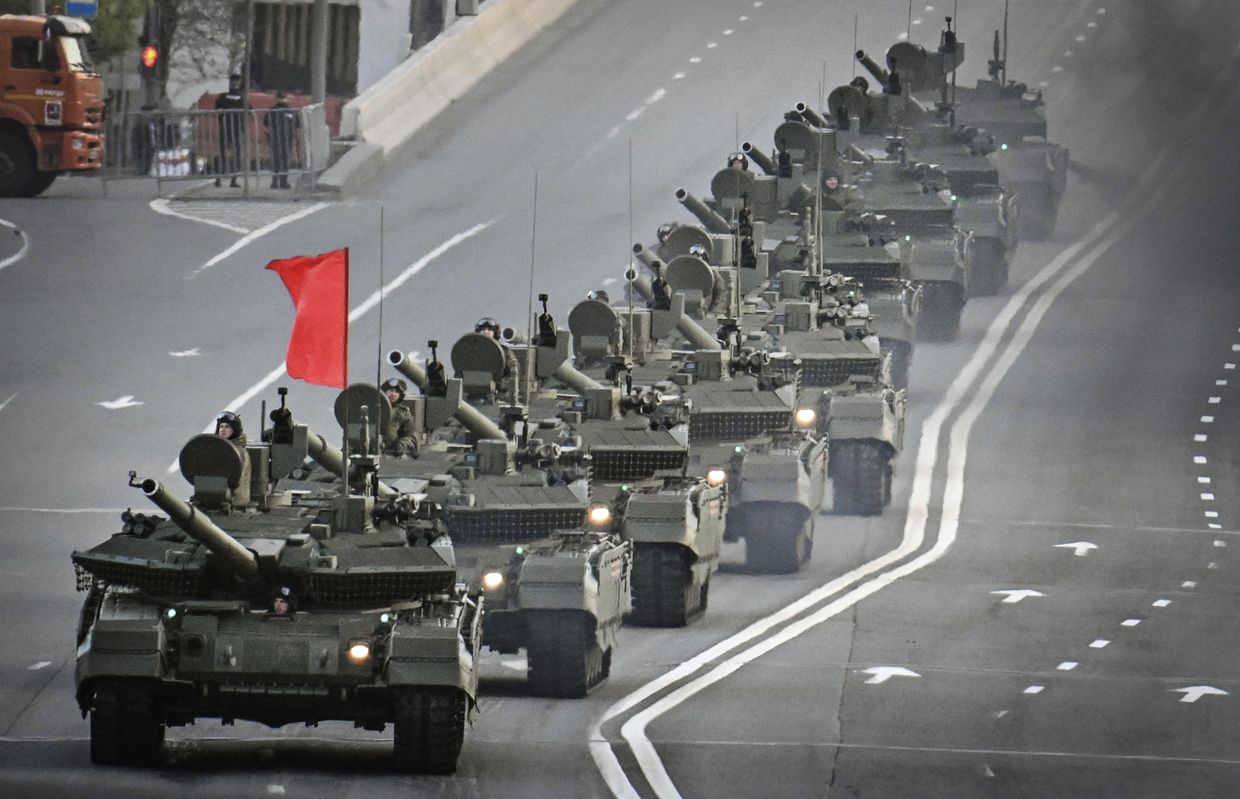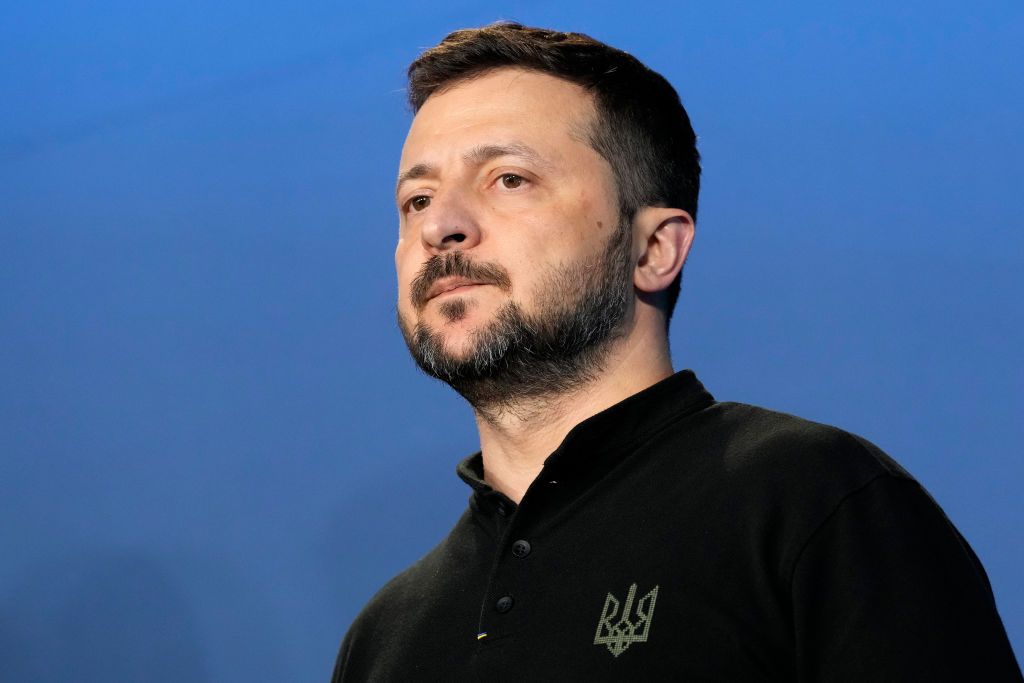According to the Verkhovna Rada's website, Ukraine completed the ratification of the U.S.-Ukraine minerals agreement on May 12. President Volodymyr Zelensky signed the deal.
"I believe both leaders are going to be there," U.S. President Donald Trump said.
"I myself have heard relatives talking: our village is being attacked, let's roll the car out of the garage, maybe they will shell it — at least we will get money. The car is old, we can't sell it," Belgorod Oblast Governor Vyacheslav Gladkov said.
The new tranche brings total recent EU defense support for Ukraine to 3.3 billion euros ($3.6 billion), marking a significant expansion of European efforts to boost Kyiv's defense industry.
"The clock is ticking — we still have twelve hours until the end of this day," German government spokesperson Stefan Kornelius reportedly said.
"There is no point in prolonging the killings. And I will wait for Putin on Thursday in Turkey," President Volodymyr Zelensky said.
"Russia is ready for negotiations without any preconditions," Putin claimed in an address marking the end of the three-day Victory Day ceasefire. He invited Ukraine to begin talks in Istanbul on May 15.
Both men face charges related to terrorism and espionage. Daniil B. was detained in Lithuania, where he is in temporary custody, while Oleksandr V. remains at large in Russia.
Foreign Minister Andrii Sybiha said Ukraine and its allies discussed tougher sanctions against Russia's banking sector, central bank, and energy industry.
"We are ready for all options. But of course, we are separately waiting for a response on the ceasefire," a source close to President Volodymyr Zelensky told the Kyiv Independent.
The EU plans to unveil on May 14 its next package of sanctions imposed against Russia over its aggression against Ukraine, an EU official told the Kyiv Independent on condition of anonymity.
Polish truckers plan to restrict freight traffic at the Yahodyn-Dorohusk checkpoint on the Ukrainian border, Ukraine's State Border Guard said on May 12.
"If the Russians are using this level of specialists in urban combat, they are probably facing some difficulties," Ivan Petrychak, spokesperson for the 24th Separate Mechanized Brigade, said.
Belarus Weekly: Lukashenko frees 37 political prisoners; charges pressed against Belarus fighter

In the fourth round of pardons since July, Lukashenko frees another 37 political prisoners, with around 1,300 remaining behind bars.
Prosecutors in the Russian-occupied Donetsk Oblast pressed charges against a Belarusian Kalinouski Regiment fighter held in captivity for two years.
Latvian parliament passes a bill banning Belarus-registered vehicles from entering and driving in the country.
Russia designates Polish-backed Belarusian publication Belsat as “undesirable.”
Belarusian political activist Andrei Hnyot, under threat of extradition to Belarus, appeals to Serbia's President Aleksandar Vučić for his release.
Lukashenko pardons 37 more political prisoners, another 1,300 remain in prison
Belarusian dictator Alexander Lukashenko “pardoned” 37 Belarusians convicted of “extremist crimes” on the eve of the Day of National Unity in Belarus, Lukashenko’s press office reported on Sept. 16.
In the fourth round of “pardons,” a number of people with disabilities, elderly, and chronically ill prisoners were released in what the regime described as a “humane gesture” towards those “who had gone astray.”
According to Lukashenko’s press office, all of the released have repented, and their freeing was approved by a commission headed by Prosecutor General Andrei Shved.
The names of 25 released prisoners were revealed by Raman Pratasievich, formerly a staunch political opponent of Lukashenko’s, who was jailed after being taken from a commercial flight that was forced by Belarusian warplanes to land in Minsk in May 2021. Pratasievich was pardoned a year later and has since become a propaganda mouthpiece for the Lukashenko regime.

Belarusian opposition leader in exile Sviatlana Tsikhanouskaya said the release was an “immense relief.” However, she noted that arrests and torture are continuing in Belarus.
Following last week’s third round of releases, Lukashenko complained that the Belarusian opposition had shown him “no gratitude” for this gesture. Regime propagandist Yury Vaskrasenskiy called for “a discussion” to be opened with Western states in order for the releases to continue.
The European Union said it took note of the previous instances of pardons being given, but repeated its demand for the full and unconditional release of all Belarusian political prisoners.
Since the first round of pardons on July 3, timed to coincide with Independence Day in Belarus, 115 political prisoners have been reportedly released. However, the Lukashenko regime is continuing its crackdown on dissent. Over July and August, human rights activists added 115 new names to the list of recognized political prisoners in Belarus. On Sept. 16, that count rose again, with 22 new names being added.
Russian prosecutors press charges against captured Kalinouski regiment fighter
Prosecutors in the Russian-occupied part of Ukraine’s Donetsk Oblast approved charges of mercenarism against a Belarusian fighter from the Kastus Kalinouski Regiment, Yan “Thrombly” Dziurbeika, and passed them to court, Russian General Prosecutor’s Office reported on Sept. 17.
According to the prosecutors’ statement, the 28-year-old Dziurbeika participated “in hostilities” on the Ukrainian side as a mercenary between February and July 2022 and was compensated the “equivalent of more than 300,000 rubles” (roughly $3,300).
Moscow’s District Court ordered Dziurbeika to be arrested in absentia on July 24, 2024, despite him already having been in Russian captivity for nearly two years.
If convicted, the Kalinouski Regiment soldier faces a prison term of seven to fifteen years.
Dozens of Ukrainian soldiers, who should legally be considered POWs and be offered the associated legal protections, are now facing trial in Russia.
For Belarusian volunteer fighters, captivity brings the risk of extradition and persecution at home. The Lukashenko regime considers the Kalinouski regiment to be an extremist organization.
In 2022 alone, according to Belarusian Prosecutor General Shved, Russia extradited to Belarus sixteen citizens facing charges in politically motivated cases.
Dziurbeika fled Belarus to Ukraine in 2020 following his administrative arrest and pending criminal prosecution for participating in anti-government protests that erupted after the rigged presidential elections that Lukashenko claimed to have won in a landslide.
Dziurbeika joined the Ukrainian military on the first days of Russia’s full-scale invasion of Ukraine in February 2022 and was captured in June 2022 along with another volunteer, Siarhei “Kleshch” Dzyohtseu, during fighting for Lysychansk, a now-occupied city in Ukraine’s Luhansk Oblast. Dziurbeika’s and Dzyohtseu’s whereabouts had been unknown until now.
Over 1,300 Belarusians have fought for Ukraine since 2014, and 350 Belarusians were serving in the Kastus Kalinouski Regiment as of January 2024, according to Andrei Kushnerau, founder of the Association of Belarusian Volunteers. Sixty Belarusian fighters have been killed in action since 2014.
Latvian parliament approves ban on Belarus-registered vehicles
Latvian parliament, the Saeima, has approved amendments to the law stipulating that Belarus-registered cars must be removed or re-registered in Latvia by Oct. 31, the parliament’s press office has reported.
The bill, which passed its second and final reading on Sept. 10, also imposes entry restrictions for Belarusian-registered passenger cars. A full entry ban for Belarusian vehicles was slightly relaxed to allow one transit crossing of Latvian territory if a personal request is made to the Road Traffic Safety Directorate and it is approved.
Failure to comply with the requirements can lead to confiscation of vehicles.
The restrictions were introduced in compliance with broader EU sanctions imposed on June 29 against Belarus for its complicity in Russia’s war against Ukraine.
The sanctions, mirroring restrictions introduced earlier against Russian-registered vehicles, seek to close loopholes allowing the circumvention of sanctions.
The Council Regulation (EU) 2024/1865 lists passenger cars as being among goods prohibited in the EU if they “originate or are exported from Belarus.” The regulation, however, reserves the right for the bloc's member states to allow the entrance of such goods if they are intended strictly for personal use by individuals traveling to the EU and their immediate family members.”
Belarus’ exiled opposition spoke out against the restrictions, saying they were “hasty and harmful.”
“(The ban) hits people, not the regime,” Tsikhanouskaya said. “The border with the EU is the border with the free world. It should be open for Belarusians who do not support the regime and see the future of their country in Europe.”
On the introduction of the restrictions, Poland, which currently hosts one of the largest Belarusian diasporas, said that Belarus-registered vehicles would be allowed to cross the border if driven by their owners.
Lithuania, home to Sviatlana Tsikhanouskaya’s office in exile, relaxed an initial complete ban, allowing Belarus-registered vehicles into the country if they are driven by their owners and are not meant for sale. Their owners must also have a valid visa or residence permit.
Estonia, which does not share a border with Belarus, has imposed a full ban on the entry of Belarusian-registered vehicles.
Russia declares Belarusian-language publication Belsat to be ‘undesirable’
The Russian Prosecutor General Office declared the Polish-based Belsat TV Channel, which predominantly broadcasts in the Belarusian language, as an “undesirable organization.”
According to a press release published on Sept. 13, Russian prosecutors accuse Belsat of “discrediting Russia’s internal and foreign policies,” “criticizing the Russia-Belarus Union State,” and “spreading lies” about the war in Ukraine.
Designation as an undesired organization entails a ban on business operations within Russia. The designated organization’s subdivisions must be closed, and bank transfers must be suspended.
The acting director of Belsat, Aliaksei Dzikavitskyi, said that the designation provides for the criminal prosecution of those of Belsat’s journalists remaining in Russia, but he said this would not “prevent viewers and readers from having access to truthful and propaganda-free information.”
“This is another manifestation in a long list of repressions that have affected Belsat and its journalists for doing their honest and uncompromising work for the 17 years of (Belsat’s) existence,” Dzikavitskyi said.
The Poland-based flagship broadcaster for Belarus, Belsat, was founded in 2007, according to an agreement between the Polish Ministry of Foreign Affairs and Polish state broadcaster TVP.
The Belarusian authorities have pressured the channel and its journalists throughout its existence. Following the sham presidential elections in 2020, which Belsat has extensively covered, the Lukashenko regime designated Belsat’s content as “extremist.” Seventeen Belsat journalists remain behind bars, including Katsiaryna Andreyva, who was sentenced to eight years in prison.
While surviving in the hostile Belarusian media field, Belsat fell victim to Poland’s own domestic political turmoil in 2024. As TVP underwent formal liquidation to restore the broadcaster’s impartiality, Belsat lost 47% of its total financing.
The Belarusian-language channel is also to be merged with offices that broadcast in Russian. As a result of the merger, which is scheduled for March 1, 2025, Belarusian airtime would be reduced from 12 to eight hours.
The International Press Institute has urged Poland’s Foreign Ministry to reconsider its decision to cut the financing of Belsat.
Belarusian activist appeals to Serbian president as court returns his extradition case for retrial
Belarusian political activist and film director Andrei Hnyot, supported by over 780 international artists and intellectuals, has sent an appeal to Serbian President Aleksandar Vučić for his release.
Hnyot’s appeal comes after the Appeal Court in Belgrade annulled the previous decision to extradite him but ordered a retrial of the case.
Arrested at Belgrade airport at Belarus’ request under an Interpol warrant, Hnyot has been in Serbia since October 2023, first in prison and later on house arrest. The Lukashenko regime accuses the opposition activist of tax evasion – charges that Hnyot dismisses as a faux pretext for a politically motivated persecution.
The Interpol warrant was soon revoked, but the activist remained under house arrest pending possible extradition to Belarus, where he might face imprisonment and torture.
The Appeal Court in Belgrade, which was expected to be the highest court in the judicial process, found that the Higher Court’s extradition ruling was made “based on an incomplete establishment of the facts, which led to a significant violation of criminal procedure rules.” The decision, which was published on Sept. 11, annulled the Higher Court’s extradition ruling but ordered the case to be retried.
The activist says that his position has worsened with the new ruling, leaving him under house arrest and still threatened with extradition.
“My situation has not improved, but has become even worse,” Hnyot wrote on Facebook.
“The court has been instructed to correct the flaws in the case so that the extradition procedure is legally sound.”
Hnyot’s defense maintains that the Appeals Court could have independently considered the case and made a final decision without a repeated trial, attributing the delay to underlying politics.
Notable filmmakers Wim Wenders, Yorgos Lanthimos, Agnieszka Holland, Juliette Binoche, and Belarusian Nobel Prize winner Sviatlana Aleksiyevich all signed a letter supporting the Belarusian film director and asking for his release.
In 2020, Hnyot participated along with thousands of others in widespread protests against the results of the Belarusian presidential elections that were widely declared to be nor free nor fair. He founded the Belarus’ Free Association of Athletes, which was later branded as an extremist organization by the Belarusian government.
His trials in Serbia underscore how authoritarian regimes like Belarus can exploit Interpol’s “Red Notice” arrest warrant system to harass exiled dissidents with politically motivated charges.
Most Popular

After 3 years of full-scale war in Ukraine, Europe announces plan to ban all Russian gas imports

Journalist Roshchyna's body missing organs after Russian captivity, investigation says

Ukrainian sea drone downs Russian fighter jet in 'world-first' strike, intelligence says

Ukraine is sending the war back to Russia — just in time for Victory Day

'Justice inevitably comes' — Zelensky on deaths of high-ranking Russian officials
Editors' Picks

How medics of Ukraine’s 3rd Assault Brigade deal with horrors of drone warfare

As Russia trains abducted children for war, Ukraine fights uphill battle to bring them home

'I just hate the Russians' — Kyiv district recovers from drone strike as ceasefire remains elusive


